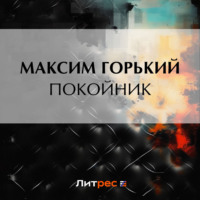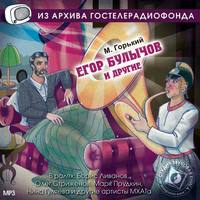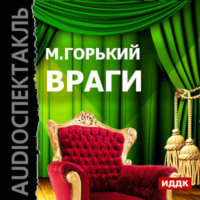
The Spy
"My life is in this package. I have written about myself – my story – who I am, and why. I want him to read it – he loves people."
Taking Yevsey's shoulder in a vigorous clutch the spy shook him, and commanded:
"You go and give it to him, into his own hands – go, tell him that one – " Maklakov broke off, and continued after a pause – "tell him that a certain agent of the Department of Safety sent him these papers, and begs him most humbly – tell him that way, 'begs him most humbly' to read them. I'll wait here for you, on the street. Go. But look out, don't tell him I'm here. If he asks, say I've escaped, went to Argentine. Repeat what I've told you."
"Went to Argentine."
"And don't forget, 'begs most humbly.'"
"No, I won't."
"Go on, quick!"
Giving Klimkov a gentle shove on the back he escorted him to the door of the house, walked away, and stopped to observe him.
Yevsey agitated and seized with a fine tremor, lost consciousness of his own personality crushed by the commanding words of Maklakov. He pushed the electric button, and felt ready to crawl through the door in the desire to hide himself from the spy as quickly as possible. He struck it with his knee, and it opened. A dark figure loomed in the light, a voice asked testily:
"What do you want?"
"The writer, Mr. Mironov – him personally. I have been told to deliver a package into his own hands. Please, quick!" said Yevsey, involuntarily imitating the rapid and incoherent talk of Maklakov. Everything became confused in his brain. But the words of the spy lay there, white and cold as dead bones. And when a somewhat dull voice reached him, "What can I do for you, young man?" Yevsey said in an apathetic voice, like an automaton, "A certain agent of the Department of Safety sent you these papers, and begs you most humbly to read them. He has gone off to Argentine." The strange name embarrassed Yevsey, and he added in a lower voice, "Argentine, which is in America."
"Yes, but where are the papers?"
The voice sounded kind. Yevsey raised his head, and recognized the soldierly face with the reddish mustache. He pulled the package from his pocket, and handed it to him.
"Sit down."
Klimkov seated himself, keeping his head bowed. The sound of the tearing of the wrapping made him start. Without raising his head, he looked at the writer warily from under lowered lids. Mironov stood before him regarding the package, his mustache quivering.
"You say he's gone off?"
"Yes."
"And you yourself are also an agent?"
"Yes," said Yevsey quietly, and thought, "Now, he'll scold me."
"Your face seems familiar to me."
Yevsey tried not to look at him. But he felt the writer was smiling.
"Yes, I suppose it is familiar to you," said Yevsey sighing.
"Have you, too, been tracking me?"
"Once. You saw me from the window. You came out into the street, and gave me a letter."
"Yes, yes. I remember. The devil! So that was you? Well, excuse me, my dear man. I think I must have offended you, eh?"
Yevsey rose from the chair, looked into his laughing face incredulously, and glanced around.
"That's nothing," he said.
He felt unbearably awkward as he listened to the somewhat rude yet kindly voice. He was afraid that after all the writer would abuse him and drive him out.
"There, you see how strangely we meet this time, eh?"
"Nothing else?" asked Yevsey confused.
"Nothing else. But I believe you are tired. Sit down. Rest."
"I must be going."
"Very well. As you please. Well, thank you. Good-by."
He extended his large hand with reddish wool on the fingers. Yevsey touched it cautiously.
"Permit me also to tell you my life," he requested unexpectedly to himself. The instant he had distinctly uttered these words, he thought, "This is the very man to whom I ought to speak, if Timofey Vasilyevich himself, such a wise person and better than everybody, respects him." Recalling Maklakov, Yevsey looked at the window, and for a moment grew anxious.
"No matter," he said to himself. "It's not the first time he's had to freeze."
"Well, why not? Tell me, if you want to. Won't you take off your overcoat? And perhaps you will have a glass of tea. It's cold."
Yevsey wanted to smile, but he restrained himself. In a few minutes, his eyes half closed, he told the writer monotonously and minutely about the village, about Yakov, and about the blacksmith. He spoke in the same voice in which he reported his observations in the Department of Safety.
The writer, whom Yevsey observed from under his lashes, was sitting on a broad, heavy taborette, his elbows on the table, over which he bent, twirling his mustache with a quick movement of his fingers. His eyes gazed sharply and seriously into the distance above Klimkov's head.
"He doesn't hear me," thought Yevsey, and raised his voice a little, continuing to examine the room without himself being observed, and jealously watching the face of the author.
The room was dark and gloomy. The shelves crammed with books, which increased the thickness of the walls, apparently kept out the sounds of the street. Between the shelves the glass of the windows glistened dully, pasted over with the cold darkness of the night, and the white narrow stain of the door obtruded itself on the eye. In the middle of the room was a table, whose covering of grey cloth seemed to lend a dark grey tone to everything around it.
Yevsey was ensconced in a corner of a chair covered with a smooth skin. For some reason he propped his head hard against its high back, then slid down a little. The flames of the candles disturbed him; the yellow tongues slowly inclining toward each other, seemed to be holding a conversation. They trembled, and straightened themselves out, struggling upward. Back of the author over the sofa, hung a large portrait, from which a yellow face with a sharp little beard looked out sternly.
The author began to twirl his mustache more slowly, but his look as before travelled beyond the confines of the room. All this disturbed Yevsey, breaking the thread of his recollections. He be-thought himself of closing his eyes. When he did so, and darkness closely enveloped him, he sighed lightly. Suddenly he beheld himself divided in two – the man who had lived, and the other being who was able to tell about the first as about a stranger. His speech flowed on more easily, his voice grew stronger, and the events of his life drew themselves connectedly one after the other, unrolling easily like a ball of grey thread. They freed the little feeble soul from the dirty and cumbersome rags of its experiences. It was pleasant to Yevsey to tell about himself. He listened to his own voice with quiet astonishment. He spoke truthfully, and clearly saw that he had not been guilty of anything, for he had lived all his days not as he had wanted to, but as he had been compelled to do; and he had been compelled to do what was unpleasant and unnecessary to him. Filled with a sense of sincere self-pity, he was almost ready to weep and to fall in love with himself.
Whenever the author asked him a question, which Yevsey did not understand, he would say without opening his eyes, sternly and quietly:
"Wait, I'm telling it in order."
He spoke without wearying, but when he came to the moment of his meeting with Maklakov, he suddenly stopped as before a pit. He opened his eyes, and saw at the window the dull look of the autumn morning, the cold grey depth of the sky. Heaving a deep sigh, he straightened himself up. He felt washed within, unusually light, unpleasantly empty. His heart was ready submissively to receive new orders, fresh violence.
The author rose noisily from his seat, tall and strong. He pressed his hands together, cracking his fingers disagreeably.
"What do you think of doing now?" he asked, as he turned to the window without looking at Klimkov.
Yevsey also rose, and repeated with assurance what he had told Maklakov.
"As soon as the new life is arranged, I'll quietly go into some business – I'll go to another city – I've saved about one hundred and fifty rubles."
The author turned to him slowly.
"So?" he said. "You have no other desire whatsoever?"
Klimkov thought, and answered:
"No."
"And you believe in the new life? You think it will arrange itself?"
"Of course. How else? If all the people want it. Why won't it arrange itself?"
"I'm not saying anything."
Mironov keeping silent turned to the window again, and straightened out his mustache with both hands. Yevsey stood motionless, awaiting something and listening to the emptiness in his breast.
"Tell me," said the writer softly and slowly, "aren't you sorry for those people, that girl, your cousin, and his comrade?"
Klimkov bowed his head, and drew the skirts of his coat together.
"You found out that they were right, didn't you?"
"At first I was sorry for them. I must have been ashamed, I suppose. But now I'm not sorry any more."
"No? Why not?"
Klimkov did not answer at once. At the end of a few moments he said:
"Well, they are good people, and they attained to what they wanted."
"And didn't it occur to you that you were in a bad business?"
Yevsey sighed.
"Why, I don't like it. I do what I'm told to do."
The author stepped up to him, then turned aside. Klimkov saw the door through which he had entered, saw it because the author's glance was turned to it.
"I ought to go," he thought.
"Do you want to ask me anything?" inquired the author.
"No, I am going."
"Good-by." And the host moved to let him pass. Yevsey walking on tip-toe went into the ante-chamber, where he began to put on his overcoat. From the door of the room he heard a question:
"Listen, why did you tell me about yourself?"
Squeezing his hat in his hands Yevsey thought, and answered:
"Just so. Timofey Vasilyevich respects you very much, the one who sent me."
The writer smiled.
"Aha! Is that all?"
"Why did I tell him?" Klimkov suddenly wondered. Blinking his eyes, he looked fixedly into the author's face.
"Well, good-by," said the host, rubbing his hands. He moved away from his visitor.
Yevsey nodded to him politely.
"Good-by."
When he came out of the house, he looked around, and immediately observed the black figure of a man at the end of the street in the grey twilight of the morning. The man was quietly striding along the pavement holding his head bent.
"He's waiting," Klimkov thought. He shrank back. "He'll scold me. He'll say it was too long."
The spy must have heard the resonant sound of steps on the frozen paving in the stillness of the morning. He raised his head, and fairly ran to meet Yevsey.
"Did you give it to him? Yes?"
"I did."
"Why were you so long? Did he speak to you? What did he ask?"
Maklakov shivered. His cheeks were blue, his nose red. He seized the lapels of Yevsey's overcoat, and instantly released him, blew on his fingers, as if he had burned them, and began to tramp his feet on the ground. Thus, chilled through and through, and pitiful, he was not awe-inspiring.
"I, too, told him all my life," Yevsey declared aloud. It was pleasant to tell Maklakov about it.
"Well, didn't he ask about me?"
"He asked whether you had gone away."
"What did you say?"
"I said you had."
"Yes. Nothing else?"
"Nothing."
"Well, let's go. I'm frozen, brother." Maklakov darted forward, thrusting his hands in his overcoat pockets, and hunching his back. "So you told him your life?"
"The whole of it, completely, to the very moment of my last meeting with you," answered Yevsey, again experiencing a pleasant sensation, which raised him to the same level as the spy whom he respected.
"What did he say to you then?"
For some reason confused and embarrassed Klimkov waited before he replied.
"He didn't say anything."
Maklakov stopped, seized him by the sleeve, and asked in a stern though quiet tone:
"Did you give him my papers?"
"Search me, Timofey Vasilyevich," Yevsey cried sincerely.
"I won't," said Maklakov, after reflecting. "Well, now good-by. I'll disappear this very day. Take my advice. I'm giving it, because I pity you. Get out of this service and be quick about it. It's not for you, you know it yourself. Go away now. Now is the time to leave. You see what days these are. The dead are coming to life, people trust one another, they can forgive much in a period like this; they can forgive everything, I think. And above all, avoid Sasha. He's sick and insane. He's made you deliver up your cousin, he – he ought to be killed, like a mangy dog. Well, good-by, brother." He seized Yevsey's hand in his cold fingers, and pressed it firmly. "So you gave him my papers?" he asked once more. "You're sure of it, are you?"
"I did – by God! The moment I caught sight of him I at once remembered him."
"All right. I believe you. Don't speak about me there for a few days, I beg you."
"I'm not going there. On the twentieth I'll call for my salary."
"Tell them then. By that time I'll be far away. Good-by."
He turned the corner quickly. Yevsey looked after him, thinking suspiciously:
"He's going off. Probably he did something against the authorities, and got frightened. How he looks, just as if he had gotten a beating."
He grew sorry for himself at the thought that he would never again see Maklakov. Nevertheless, it was agreeable to recall how weak, chilled through, and troubled the spy had looked, the spy who had always borne himself so calmly and firmly.
"He spoke boldly even with the officers of the Department of Safety, spoke to them as if he were their equal. But apparently he was all the time afraid of the author who was under surveillance. And here am I, a little man," thought Yevsey, as he strode down the street, "a little man, afraid of everybody, yet the author didn't frighten me. I was drinking tea at his house, while Maklakov was shivering on the street." Klimkov content with himself smiled. "He couldn't say anything, the author couldn't." Yevsey was suddenly seized with a mingled feeling of sadness and insult. He slackened his pace, and sank into reflections as to why this was. He sought the cause of the grief that unexpectedly rose within him.
"Why did I speak to him?" he thought again on the way. "Instead, I should have told it that time to Olga."
The city awoke, and Yevsey wanted to sleep. He felt uneasiness, discomfort in his breast again. His heart was like a little room from which all the furniture has been removed, and which is left bare and empty, with green stains of dampness on the torn wall-paper, showing the dumb patterns made by the chinks in the plastering.
He wanted to sleep, but it was pleasant to stroll the streets, and he walked homeward with reluctant steps.
CHAPTER XXVI
About midday Yevsey was awakened by Viekov dressed in an overcoat and hat. He looked downcast. He shook the back of the bed, and said in a muffled voice, monotonously:
"Hey, Klimkov, get up. They are summoning everybody to the office. Hey, Klimkov – they have proclaimed the constitution. They are summoning all the agents from their lodgings. Filip Filippovich gave the order. Do you hear, Klimkov?"
His words fell like large drops of rain, full of sadness. His face was drawn, as with the toothache. His eyes blinked frequently, as if he were about to cry.
"What is it?" asked Yevsey jumping from bed.
Viekov pursed his lips dismally.
"Is it possible to understand? They said yesterday the Czar would give a full constitution, and to-day here's the manifesto, he's actually giving it. Our Department has become like an insane asylum – that Sasha is such a coarse creature, astonishing. He keeps shouting, 'Strike, slash,' and so forth. Why, look here, I wouldn't make up my mind to kill a man even for five hundred rubles. Yet he proposes we should kill for forty rubles a month. Why, it's savagery even to listen to such talk." Viekov puffed his cheeks, and sighed in weariness of spirit, as he paced up and down the room. "It's horrible. Dress quickly. We must go."
Pulling on his trousers Klimkov asked musingly:
"Whom do they want us to kill?"
"The revolutionists. Although what revolutionists are there now? According to the Czar's ukase, you'd suppose the revolution was ended. They tell us we should gather the people in the streets, march with flags, and sing, 'God Save the Czar.' Well, why not sing, if liberty has been granted? But then they say that while doing this, we should shout 'Down with the constitution,' and so forth. I can't for the life of me understand. That's going against the manifesto and the will of the Czar Emperor. There are many besides me who don't understand it. I'm not the only one."
His voice sounded protesting, insulted, his legs clapped together. He seemed as soft as if his bones had been removed from his body.
"I'm not going there," said Klimkov.
"What do you mean?"
"Just so. First I'll walk the streets, and see what they're going to do."
Viekov sighed again, and whistled.
"Yes, of course. You're a single man. But when you have a family, that is, a woman who demands this, that, the fifth thing, and the tenth thing, then you'll go where you don't want to, yes, you will. The need for a living compels a man to dance a tightrope. When I see tricks on a tightrope, my head begins to turn, and I feel a pain in the lower part of my chest. But I think to myself, 'If it would be necessary for your livelihood, then you, too, Ivan Petrovich Viekov, would dance a tightrope.' Yes, indeed. A poor man must live by doing things that wring his heart, and whether he wants to or not. Such is the law of nature, as Grokhotov says."
Viekov tossed himself about the room, knocking against the table and the chairs, mumbling and swelling his rosy cheeks. His little face was puffed like a bladder. His insignificant eyes disappeared, and the little red nose hid itself between his cheeks. His sorrowful voice, his dejected figure, his hopeless words annoyed Klimkov, who said unamiably:
"Soon everything will be arranged differently. So there's no use complaining now."
"But in our place they don't want a different arrangement," exclaimed Viekov, gesticulating, and stopping in front of Yevsey. "You understand?"
Yevsey disturbed turned on the chair, desiring to express a thought in his mind, but he was unable to find words, and began to lace his shoes sniffling.
"Sasha shouts, 'Beat them. Show them what liberty is. So that they may,' he says, 'get afraid of it.' Viakhirev displays revolvers. 'I'll shoot,' he says, 'straight into the eyes.' Krasavin is gathering a gang of some sort of people, and also speaks about knives, and hacking people down, and all such things. Chasin is preparing to kill a certain student, because he took his mistress from him. Some other new fellow has come. He's one-eyed, and smiles all over, and his teeth are knocked out in front. A very terrible face. Sheer savagery, all this."
Viekov lowered his voice to a whisper, and said mysteriously,
"Everyone ought to protect his means of a livelihood. That's understood – but preferably without murder. Because if we start to kill, then we in turn will be killed, too."
Viekov shuddered. He turned his head toward the window, and listened to something. Then he raised his hand, and his face turned pale.
"What's the matter?" asked Yevsey.
A resonant noise hit against the windows in soft uneven blows, as if to open them cautiously and pour itself into the room. Yevsey rose to his feet with a look of inquiry and alarm at Viekov; while Viekov standing at some distance from the window stretched his hand out in order to open it, apparently taking care not to be seen from the street. At the same moment a broad stream of sounds broke in, surrounded the spies, pushed against the door, opened it, and floated into the corridor, powerful, exulting, sturdy.
"They are rejoicing," said Viekov quietly, starting.
"Look out and see what it is," said Yevsey, hurriedly throwing an overcoat on.
But Viekov was already looking out, and he began to report what he saw, every minute quickly turning his head from the window to Yevsey. He spoke rapidly and brokenly.
"The people are marching – red flags – a great many people – countless – of various stations – all mixed up in one crowd – an officer even – and Father Uspensky – without hats – Melnikov with a flag – our Melnikov – look!"
Yevsey ran to the casement, looked down, and there saw a thick mass of people filling the entire street. In his eyes gleamed a compact mass of faces, which shone like the stars in the Milky Way. Over the heads of the throng waved flags resembling red birds. Klimkov was deafened by the seething noise. In the first row he saw the tall, bearded figure of Melnikov, who held the short pole of the standard in both hands, and waved it. At times the cloth of the flag enveloped his head like a red turban. From under his hat escaped dark strands of hair, which fell on his forehead and cheeks, and mingled with his beard. He was shaggy as a beast. Evidently he was shouting, for his mouth stood wide open.
"Where are they going?" mumbled Klimkov, turning to his comrade.
"They are rejoicing," Viekov repeated, and looked out into the street, leaning his forehead against the glass.
Both men were silent, attentively watching the motley stream of people. With acute hearing they caught the loud splashings of different exclamations in the deep sea of the din.
Viekov shook his head.
"What a power, eh? The people lived each by himself and now suddenly they all move together – what a phenomenon!"
"They've grown wise, it means. They are becoming masters of life," said Yevsey with a smile. At that moment he actually believed so.
"And our Melnikov, did you see him?"
"He always stood up for the people," Yevsey explained didactically. He left the window, feeling himself near his aim, bold and new.
"Now everything will go well. No one wants another to order him about. Everyone wants to live according to his needs, quietly, peacefully, with things arranged in a good system," he said gravely, examining his sharp face in the mirror. He liked his face to-day. It was calm, almost cheerful. Wishing to strengthen the new and pleasant feeling of satisfaction with himself, he reflected on how he might raise himself in the eyes of his comrade. So he announced with an air of mystery, "Do you know, Maklakov has escaped to America?"
"So?" the spy rejoined indifferently. "What of it? He's a single man."
"Why did I tell him?" Yevsey reproached himself. A feeling of slight alarm and enmity came over him.
"Don't speak of this to anybody, please," he begged Viekov.
"About Maklakov? Very well – I have to go to the office. Aren't you going?"
"No, but we can go out together."
On the street Viekov remarked in dismal irritation, speaking in a subdued voice:
"Stupid people, after all. They ought not to be going about with flags and songs. Now they have once begun to feel themselves in power they ought to ask the authorities straightway to abolish all sorts of politics, to transform everybody into people, both us and the revolutionists, to distribute awards to whom they are due, both on our side and theirs, and to make a strict announcement, 'All politics strictly prohibited.' We've had enough of hide and seek!"
Viekov suddenly disappeared around the corner without taking leave of Klimkov. Yevsey walked like a man who to-day has no reason to hasten.
"I have one hundred and fifty rubles," he thought. "I have an inclination for business, and I know about it to some extent. In business a man is free. Soon I'll receive twenty-five rubles more."
The people moved about in the street excitedly, all spoke loud, all faces smiled joyously, and the gloomy autumn evening recalled a bright Easter day. Songs started up, now nearby, now at the end of the street curtained by a grey cloud. Loud shouts quenched the singing.
"Long live liberty!"
From everywhere came laughter and the sound of kindly voices. This pleased Klimkov. He politely stepped aside for those who came his way, looking at them approvingly with a light smile of satisfaction, and continued to picture his future in warm colors.
Two people darted from around the corner, laughing quietly. One of them jostled Yevsey, but immediately pulled off his hat, and exclaimed:








